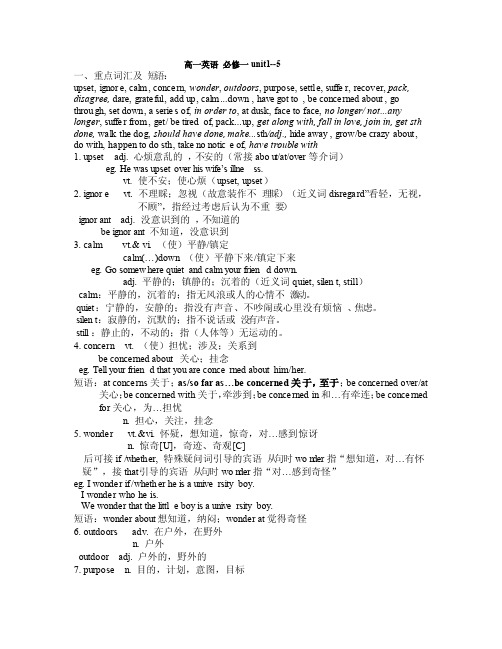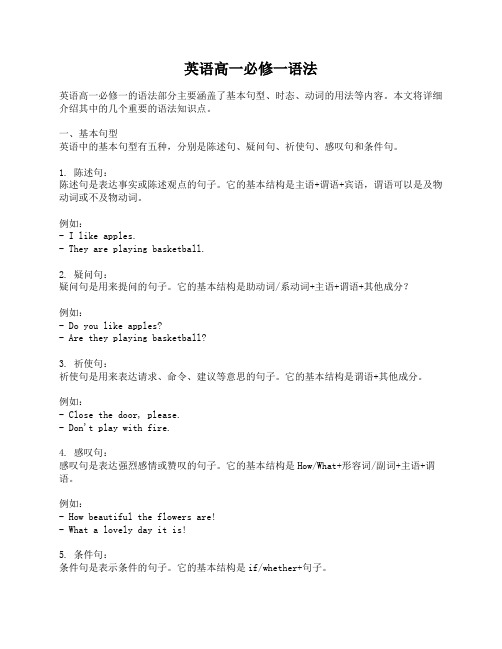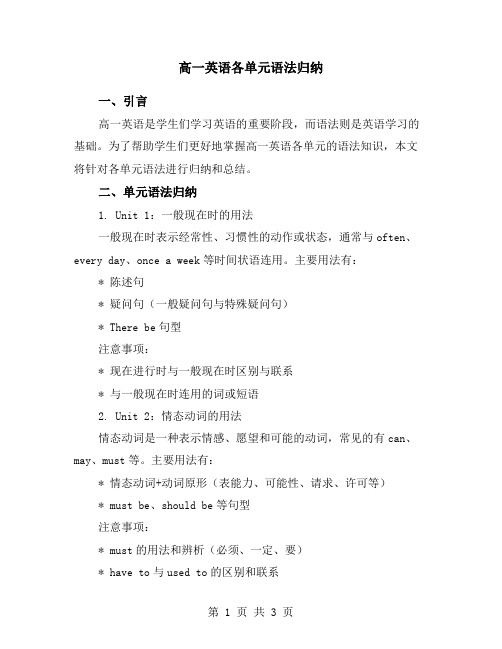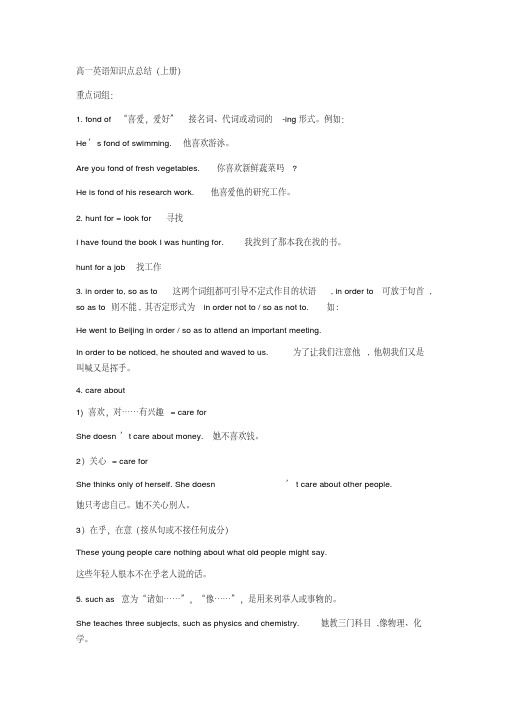高一英语重点句型和语法
高一英语必修一语法归纳

高一英语必修一 unit1--5一、重点词汇及短语:upset, ignore, calm, concer n, wonder, outdoo rs, purpos e, settle, suffer, recove r, pack, disagr ee, dare, gratef ul, add up, calm...down , have got to , be concer ned about, gothroug h, set down, a series of, in orderto, at dusk, face to face, no longer/ not...any longer, suffer from, get/ be tiredof, pack...up, get alongwith, fall in love, join in, get sth done, walk the dog, should have done, make...sth/adj., hide away, grow/be crazyabout, do with, happen to do sth, take no notice of, have troubl e with1. upsetadj. 心烦意乱的,不安的(常接abou t/at/over等介词)eg. He was upsetoverhiswife‘sillnes s.vt. 使不安;使心烦(upset, upset)2. ignore vt. 不理睬;忽视(故意装作不理睬)(近义词disregar d‖看轻,无视,不顾‖,指经过考虑后认为不重要)ignora nt adj. 没意识到的,不知道的be ignora nt 不知道,没意识到3. calm vt.& vi. (使)平静/镇定calm(…)down(使)平静下来/镇定下来eg. Go somewh ere quietand calm your friend down.adj. 平静的;镇静的;沉着的(近义词quiet, silent, still)calm:平静的,沉着的;指无风浪或人的心情不激动。
英语高一必修一语法

英语高一必修一语法英语高一必修一的语法部分主要涵盖了基本句型、时态、动词的用法等内容。
本文将详细介绍其中的几个重要的语法知识点。
一、基本句型英语中的基本句型有五种,分别是陈述句、疑问句、祈使句、感叹句和条件句。
1. 陈述句:陈述句是表达事实或陈述观点的句子。
它的基本结构是主语+谓语+宾语,谓语可以是及物动词或不及物动词。
例如:- I like apples.- They are playing basketball.2. 疑问句:疑问句是用来提问的句子。
它的基本结构是助动词/系动词+主语+谓语+其他成分?例如:- Do you like apples?- Are they playing basketball?3. 祈使句:祈使句是用来表达请求、命令、建议等意思的句子。
它的基本结构是谓语+其他成分。
例如:- Close the door, please.- Don't play with fire.4. 感叹句:感叹句是表达强烈感情或赞叹的句子。
它的基本结构是How/What+形容词/副词+主语+谓语。
例如:- How beautiful the flowers are!- What a lovely day it is!5. 条件句:条件句是表示条件的句子。
它的基本结构是if/whether+句子。
例如:- If it rains tomorrow, we will stay at home.- Whether she comes or not, I will go to the party.二、时态在英语中,时态用于表示动作发生的时间。
高一必修一中涵盖了一般现在时、一般过去时、一般将来时等几个基本时态。
1. 一般现在时:一般现在时用于表示经常性的动作、习惯、真理、科学事实等。
它的基本结构是主语+谓语。
例如:- She goes to school every day.- Water boils at 100 degrees Celsius.2. 一般过去时:一般过去时用于表示过去发生的动作或状态。
高一英语重点语法知识点总结归纳5篇分享

高一英语重点语法知识点总结归纳5篇分享高一英语语法1一般现在时1. 表示现在习惯或经常反复发生的动作或存在的状态, 常与usually, always, sometimes, often, every day /week / month / year等时间状语连用.[例句] He often does his homework in his study.2. 表示主语现在的特征.性格和状态.[例句] The dictionary belongs to me.3. 表示客观规律或科学真理.格言, 以及其他不受时间限制的客观存在.[例句] The moon goes around the sun.4. 在有连词if, unless, before, as soon as, when, once,however等引导的时间.条件和让步状语从句中, 用一般现在时表将来.[例句] If you work hard, you won’t fail in the e_am.高一英语语法2(一) 语法一致原则: 即主语为单数,谓语用单数,主语为复数,谓语也用复数.以下为注意事项: 1. 单数主语即使后面带有with , alongwith, together with, like(象), but (除了),e_cept, besides, as well as, no lessthan, rather than(而不是), including, in addition to 引导的短语, 谓语动词仍用单数.如: Air as wellas water is matter. 空气和水都是物质.No one e_cept two servants was late for the dinner.除了两个仆人外, 没有一个人迟来用餐. 2. 用and连接的并列主语,如果主语是同一个人,同一事,同一概念, 谓语动词用单数, 否则用复数.如: Thepoet and writer has come. 那位诗人兼作家来了.(一个人) A hammer and a saw are useful tools.锤子和锯都是有用的工具. (两样物) 用and连接的成对名词习惯上被看成是一个整体, 如:bread and butter(黄油抹面包), knife andfork(刀叉)等作主语时, 谓语动词用单数. 3. 不定式(短语), 动名词(短语),或从句作主语时, 谓语动词用单数. 如: Serving thepeople is my great happiness. 为人民服务是我的幸福. When we’ll go out for an outing hasbeen decided. 我们什么时候出去郊游已决定了. 4. 用连接的并列主语被each, every 或no修饰时, 谓语动词用单数. Every boyand every girl likes to go swimming. 每个男孩和每个女孩都喜欢去游泳. No teacher and no studentwas absent from the meeting. 没有老师也没有学生开会缺席. Each man and (each) woman is askedto help. 每个男人和每个女人都被请去帮忙. 5. each of + 复数代词, 谓语动词用单数. 复数代词+each, 谓语动词用单数.如: Eachof us has something to say. 我们每个人都有话要说. 6. 若主语中有more than one 或many a/an ,尽管从意义上看是复数, 但它的谓语动词仍用单数. 但more+复数名词+than one 做主语时, 谓语动词仍用复数. 如: Many a boy likesplaying basketball. 许多男生都喜欢打篮球. More than one student was late. 不只一个学生迟到 Morepersons than one come to help us. 不止一个人来帮助我们. 7. none 做主语时,谓语动词可用单数, 也可用复数;但在代表不可数的东西时总是看作单数,因而谓语动词要用单数. 如: None of us are (is) perfect. 人无完人. None of thisworries me. 这事一点不使我着急. 8. 名词如: trousers, scissors, clothes, goods, glasses等作主语时, 谓语动词必须用复数. 如: His clothes are good. 但这些名词前若出现 a pair of , 谓语一般用单数.如: Apair of glasses is on the desk. 桌上有一副眼镜. 9. 形复意单名词如:news ; 以ics 结尾的学科名称如:physics, mathematics, economics; 国名如: the United States; 报纸名如: theNew Times;书名如: Arabian Night 天方夜谈以及The United Nations 联合国等作主语时, 谓语动词用单数.10. 〝a +名词+and a half 〝, 〝one and a half + 名词〞, 〝the number of + 名词〞等作主语时,谓语动词要用单数. 如: Only one and a half apples is left on the table. 注意: one or two +复数名词作主语, 谓语动词用复数形式, 如: One or two places have been visited. 参观了一两个地点.高一英语语法3一般将来时1. 表示将来发生的动作或存在的状态, 常与表示将来的时间状语连用.[例句] I don’t know what will happen in the future.2. 常用来表示将来时的结构包括:(1) shall / will + 动词原形:(单纯) 表将来, 一般不用于条件句.(2) be going to + 动词原形:(计划)打算做…….(3) be about to + 动词原形:即将或正要去做某事,通常不与时间状语连用,但可与when引导的从句连用.(4) be to + 动词原形:预定要做…….(5) be doing 表示按计划.安排即将发生的动作,常与go, start, set out, leave, reach, arrive,return, come, move等表位移的动词连用.高一英语语法4非真实条件句1)时态:可以表示过去,现在和将来的情况.它的基本特点是时态退后.a. 同现在事实相反的假设.句型 : 条件从句主句一般过去时 should( would) +动词原形If they were here, they would help you.b. 表示于过去事实相反的假设.句型: 条件从句主句过去完成时 should(would) have+ 过去分词If she had worked harder, she would have succeeded.The rice would not havebeen burnt if you had been more careful.If my lawyer had been here last Saturday, he would have prevented me fromgoing.If he had come yesterday, I should / would have told him about it.含义:He did not come yesterday, so I did not tell him about it.If he had not been ill and missed many classes, he would have made greaterprogress. 含义: He was ill and missed many lessons, so he did not make greaterprogress.c. 表示对将来的假想句型: 条件从句主句一般过去时 should+ 动词原形were+ 不定式 would + 动词原形should+ 动词原形If you succeeded, everything would be all right.If you should succeed, everything would be all right.If you were to succeed, everything would be all right.高一英语语法5一. 直接引语和间接引语(一)直接引述别人的原话,叫做直接引语;用自己话转述别人的话,叫做间接引语.间接引语一般构成宾语从句.直接引语必须放在引号内,间接引语则不用引号.直接引语改为间接引语时,除将引语部分变成宾语从句外,还必须对直接引语中的人称.时态.指示代词.时间状语.地点状语等进行改变.1. 时态的变化:直接引语变为间接引语时,通常受转述动词said,asked等的影响而使用过去化的时态,即把原来的时态向过去推,也就是一般现在时变为一般过去时,现在进行时变为过去进行时,等等.例如:Tom said to me,〝My brother is doing his homework.〞→Tom said to me that his brother was doing his homework.2. 人称代词.指示代词.时间状语.地点状语等等的变化: 根据意义进行相应的变化,例如:She asked Jack,〝Where have you been?〞→She asked Jack where he had be en.He said,〝These books are mine.〞→He said t hat those books were his.(二)直接引语改为间接引语时,都使用陈述语序,但是因为原句的句式不同,所以变成间接引语时所用的连词会有所不同.直接引语如果是一般疑问句,用连接词whether或if;如果是特殊疑问句,则用疑问词引导间接引语.转述的动词一般用asked,可以在其后加上一个间接宾语me,him, her, us等.如:She said,〝Is your father at home?〞→She asked me i f/whether my father was at home.〝What do you do every Sunday?〞My friend asked me.→My friend asked me what I did every Sunday.直接引语如果是祈使句,改为间接引语时,要将祈使句的动词原形变为带to的不定式,并在不定式的前面根据原句的语气(即请求或命令)加上ask, tell,order等动词,如果祈使句为否定式,则在不定式前加not.其句型为:ask / tell / order someone (not) to dosomething. 例如:She said to us,〝Please sit down.〞→She asked us to sit down.He said to him,〝Go away!〞→He ordered him to go away.He said, 〝Don’t make so much noise, boys.〞→He told the boys not to make so much noise.最新高一英语重点语法知识点总结归纳5篇分享。
高一英语各单元语法归纳

高一英语各单元语法归纳一、引言高一英语是学生们学习英语的重要阶段,而语法则是英语学习的基础。
为了帮助学生们更好地掌握高一英语各单元的语法知识,本文将针对各单元语法进行归纳和总结。
二、单元语法归纳1. Unit 1:一般现在时的用法一般现在时表示经常性、习惯性的动作或状态,通常与often、every day、once a week等时间状语连用。
主要用法有:* 陈述句* 疑问句(一般疑问句与特殊疑问句)* There be句型注意事项:* 现在进行时与一般现在时区别与联系* 与一般现在时连用的词或短语2. Unit 2:情态动词的用法情态动词是一种表示情感、愿望和可能的动词,常见的有can、may、must等。
主要用法有:* 情态动词+动词原形(表能力、可能性、请求、许可等)* must be、should be等句型注意事项:* must的用法和辨析(必须、一定、要)* have to与used to的区别和联系3. Unit 3:被动语态的用法被动语态表示主语是动作的承受者,常用的有be done、get done等形式。
主要用法有:* 被动语态的结构(be done)和形式(be being done)* 与被动语态连用的动词类型(及物动词)* 主动语态变被动语态的步骤和注意事项4. Unit 4:定语从句的用法定语从句是在句子中起修饰或限制作用的关系词,常用的关系词有that、which、who等。
主要用法有:* 关系词的种类和用法(that、which、who等)* 关系词的省略和替代(关系代词省略和关系副词替代)* 定语从句与同位语从句的区别和联系注意事项:* 限制性和非限制性定语从句的区别和联系* 关系代词that与which的区别和适用范围5. Unit 5:虚拟语气用法虚拟语气用于表达某种非真实条件状语从句,常见的有wish、if only等。
主要用法有:* 虚拟语气的形式和用法(建议、要求、建议未实现等)* 与虚拟语气连用的从句类型(名词性从句、定语从句)和从句引导词类型。
(超全!)高一英语知识点(词组+句型+对话+语法点)总结(上册)

高一英语知识点总结(上册)重点词组:1. fond of “喜爱,爱好”接名词、代词或动词的-ing形式。
例如:He’s fond of swimming. 他喜欢游泳。
Are you fond of fresh vegetables. 你喜欢新鲜蔬菜吗?He is fond of his research work. 他喜爱他的研究工作。
2. hunt for = look for寻找I have found the book I was hunting for.我找到了那本我在找的书。
hunt for a job 找工作3. in order to, so as to 这两个词组都可引导不定式作目的状语, in order to可放于句首, so as to则不能, 其否定形式为in order not to / so as not to. 如:He went to Beijing in order / so as to attend an important meeting.In order to be noticed, he shouted and waved to us.为了让我们注意他, 他朝我们又是叫喊又是挥手。
4. care about1) 喜欢,对……有兴趣 = care forShe doesn’t care about money.她不喜欢钱。
2)关心 = care forShe thinks only of herself. She doesn’t care about other people.她只考虑自己。
她不关心别人。
3)在乎,在意(接从句或不接任何成分)These young people care nothing about what old people might say.这些年轻人根本不在乎老人说的话。
5. such as 意为“诸如……”,“像……”,是用来列举人或事物的。
精选英语高一必修一语法词汇句型大总结

精选英语高一必修一语法词汇句型大总结Unit1 Friendship【重点词汇、短语】1. add up 合计2. upset vt&vi 弄翻,使…不安,使心烦,扰乱adj. 心烦意乱的,不舒服的,不适的,难过的.3. ignore不理睬、忽视4. calm (使)平静、(使)镇定calm down 平静/镇定下来5. have got to 不得不、必须6. concern (使)担忧、涉及、关系到be concerned about…关心,挂念7. go through 经历、经受8. set down 记下、放下、登记9. a series of 一系列10. on purpose 故意11. in order to 为了……12. at dusk 在黄昏时刻13. face to face 面对面地14. no longer/not…any longer 不再……15. settle 安家、定居、停留16. suffer 遭受、忍受、经历17. suffer from 遭受、患病18. recover 痊愈、恢复、重新获得19. get/be tired of 对……厌烦20. pack 捆扎,包装/包裹21. pack (sth) up 将(东西)装箱打包22. get along with 与……相处23. fall in love 爱上24. disagree 不同意25. join in 参加【重点句型】1. It was the first time in a year and a half that I had seen the night face to face. (从句时态用完成时)这是我一年半以来第一次目睹夜晚。
2. I wonder if it’s because I haven’t been able to be outdoors for so long that I’ve grown so crazy about everything to do with nature.(强调句)我不知道这是不是因为我长久无法出门的缘故,我变得对一切与大自然有关的事物都无比狂热。
高一英语必修一知识点总结之重点句型汇总
高一英语必修一知识点总结之重点句型汇总1. It is important/imperative/vital/crucial/necessary/essential to + 动词原形- It is important to take care of your health.- It is necessary to study hard for the exam.2. It is said/believed/thought that + 句子- It is said that he is a talented musician.- It is believed that exercise is good for your overall well-being.3. There is no doubt/denying/denied that + 句子- There is no doubt that he is a trustworthy person.- There is no denying that technology has greatly improved our lives.4. It is not only A, but also B.- It is not only important to eat well, but also to exercise regularly.- It is not only her talent, but also her hard work that led to her success.5. Not only A, but also B.- Not only did he study hard, but he also participated in various extracurricular activities.- Not only is she a talented singer, but she is also a gifted writer.6. It is (highly) likely/probable that + 句子- It is likely that he will be chosen as the team captain.- It is probable that the concert will be sold out.7. There is/are + 名词 + who/which- There are many students who want to join the school club.- There is a doctor who specializes in treating rare diseases.8. The more A, the more B.- The more you practice, the better you will become.- The more you study, the higher your grades will be.9. It is not until + 过去时 + that + 句子- It is not until he saw the doctor that he realized how serious his illness was.- It was not until I read the book that I understood the underlying message.10. It is + 形容词 + that + 句子- It is interesting that she chose to study abroad.- It is impressive that he managed to finish the project ahead of schedule.这些句型在高一英语必修一的学习中经常会用到,掌握这些句型可以帮助你更好地表达自己的观点和思路。
高一英语语法必背知识点总结梳理2024
高一英语语法必背知识点总结梳理2024 以下是高一英语语法必背知识点总结梳理:1. 时态与语态:- 一般现在时:表示经常性的、普遍性的动作或状态。
- 一般过去时:表示过去某个时间发生的动作或状态。
- 一般将来时:表示将来某个时间会发生的动作或状态。
- 现在进行时:表示现在正在进行的动作。
- 过去进行时:表示过去某个时间正在进行的动作。
- 现在完成时:表示过去某个时间发生的动作对现在造成的影响。
- 过去完成时:表示过去某个时间发生的动作对过去某个时间造成的影响。
2. 基本句型:- 主语 + 谓语(及物动词/不及物动词)- 主语 + 系动词(be动词)+ 表语- 主语 + 及物动词 + 宾语- 主语 + 及物动词 + 间接宾语 + 直接宾语- 主语 + 及物动词 + 宾语 + 宾语补足语- 主语 + 及物动词 + 宾语 + 宾语补足语3. 从句:- 定义从句:用来修饰名词或代词的从句。
- 名词性从句:用作主语、宾语、表语等的从句。
- 状语从句:用来修饰动词、形容词、副词等的从句。
4. 形容词与副词的比较级和最高级:- 一般形容词比较级:原级 + er。
- 一般形容词最高级:原级 + est。
- 一般副词比较级:原级 + er。
- 一般副词最高级:原级 + est。
5. 句子成分:- 主语- 谓语- 宾语- 表语- 定语- 状语6. 虚拟语气:- 虚拟条件句:表示与事实相反或与实际情况不符的假设。
- 虚拟语气的使用:表示愿望、建议、命令等。
- 与过去事实相反的虚拟:表达过去不可能实现的愿望或假设。
7. 时态与语态的转换:- 时态转换:根据具体语境和表达需要,将动词的时态进行转换。
- 语态转换:将主动语态转换为被动语态或将被动语态转换为主动语态。
8. 动词的非谓语形式:- 不定式:一般用作动词的基本形式,表示动作或状态的概念。
- 动名词:以-ing结尾,用作名词。
- 分词:以-ing或-ed结尾,用作形容词或副词。
高一英语重点句型摘抄
以下是高一英语中的一些重点句型:1. 虚拟条件句:- If I were you, I would study harder.(如果我是你,我会更努力学习。
)- If she had arrived earlier, she would have caught the train.(如果她早点到,她就能赶上火车了。
)2. 定语从句:- The book that I borrowed from the library is very interesting.(我从图书馆借的那本书很有趣。
)- The person who won the first prize is my friend.(赢得一等奖的那个人是我的朋友。
)3. 状语从句:- Although it was raining, we still went for a walk.(尽管在下雨,我们还是出去散步了。
)- While I was reading, my phone rang.(我在读书的时候,手机响了。
)4. 倒装句:- Not only did she study hard, but she also participated in various extracurricular activities.(她不仅学习努力,还参加了各种课外活动。
)- Never have I seen such a beautiful sunset.(我从未见过如此美丽的日落。
)5. 同位语从句:- The fact that he passed the exam made his parents happy.(他通过考试的事实使他的父母很高兴。
)- Her hope is that she can travel around the world someday.(她的愿望是有一天能环游世界。
)6. 祈使句:- Don't forget to bring your umbrella.(别忘了带伞。
高一英语语法知识点总结5篇分享
高一英语语法知识点总结5篇分享高一英语语法学问点总结5篇共享英语语法是针对英语语言进行讨论后,英语语法系统地总结归纳出来的一系列语言规章。
下面就是我给大家带来的高一英语语法总结,期望能帮忙到大家!高一英语语法总结1一般现在时1. 表示现在习惯或常常反复发生的动作或存在的状态, 常与usually, always, sometimes, often, every day / week / month / year等时间状语连用。
[例句] He often does his homework in his study.2. 表示主语现在的特征、性格和状态。
[例句] The dictionary belongs to me.3. 表示客观规律或科学真理、格言, 以及其他不受时间限制的客观存在。
[例句] The moon goes around the sun.4. 在有连词if, unless, before, as soon as, when, once, however等引导的时间、条件和让步状语从句中, 用一般现在时表将来。
[例句] If you work hard, you won’t fail in the exam.高一英语语法总结21.preferPrefer doing…to doing…Prefer to do rather than do2.advantages/disadvantages优势/劣势2.Ever since middle school,my sister Wang Wei and I have dreamed about taking a great bike trip.从高中起,我姐姐王维和我就始终幻想做一次宏大的自行车旅行。
连词since引导的时间状语从句用一般过去时,介词since与时间点连用It is/has been+一段时间+since+一般过去时自从……至今已经多久了。
- 1、下载文档前请自行甄别文档内容的完整性,平台不提供额外的编辑、内容补充、找答案等附加服务。
- 2、"仅部分预览"的文档,不可在线预览部分如存在完整性等问题,可反馈申请退款(可完整预览的文档不适用该条件!)。
- 3、如文档侵犯您的权益,请联系客服反馈,我们会尽快为您处理(人工客服工作时间:9:00-18:30)。
1.My wife burst into tears when she heard the bad news.2.My wife burst out crying when she heard the bad news.3.It looks as if it is going to rain.4.It looks as though it is going to rain.5.I was shocked by his wickedness.6.His behavior was, in a word, shocking.7. A number of questions came up at the meeting.8.The number of tigers has reduced abruptly in the last fifty years.9.I may vote for her at the next election.10.Three senators voted against the bill.11.There is no doubt that we will be successful.12.The movie was definitely worth seeing.13.Most of his spare time was devoted to the translation of those works.14.A fund will be set up for the dead men's families.15.Candidates who fail to meet these requirements will not be admitted to theUniversity.16.He has so few friends that his life is lonely.17.I was in such a hurry that I put my clothes on anyhow.18.Have you any concrete thoughts on how to deal with this difficulty?19.I don't know what to do with it.20.All the classmates burst into laughter when David acted out the episode.21.All the classmates burst out laughing when David acted out the episode.22.You must pay attention to your teacher in the class.23.We are much attached to each other.24.He hasn't got a ticket and neither have I.25.He hasn't got a ticket and nor have I.26.Only then did he realize that he was wrong.27.Only in this way can you save your honor.28.Mr. Smith can't have gone to Beijing, for I saw him in the library just now.29.He could have passed the exam, but he was too careless.30.Look, Tom is crying. I shouldn't have been so harsh on him.31.This story is so interesting that I want to read it again.32.She is such a lovely girl that everyone loves her.33.She is so lovely a girl that everyone loves her.34.The Olympic Games take place every four years.35.The Olympic Games take place every fourth year.36.She waters the flower every other day.37.It was in Beijing that I met him. It was ….that 为强调句型,疑问句为:was it…that……it was that 这三个单词没有实际的意义。
38.It is the first time that I have been here. 这是我第一次来这里,系动词是is 时,that 后用现在完成时。
It 可以改成that 或者this.39.It was the first time that I had been there. 这是我第一次去那里,系动词是was时,that 后用过去完成时。
It 可以改成that 或者this40.With time going by, xiaohuang is becoming taller and taller. 随着时间的流逝,小黄越来越高了。
With是介词后加ving 表主动,后加ved 表被动。
41.They can understand each other even if the don’t speak the same language.他们能够明白彼此虽然他们不讲同一种语言。
Even if = even though42.She insisted that she [should] organize the trip.= She insisted that she organizethe trip. 她坚持要求她来组织这次旅行。
Insist 为命令,要求,请求,建议时,that 后要用should 加动词原形,should 可以省略,本句是主动地。
43.She insisted that the homework should be finished. = She insisted that thehomework be finished.她坚持要求作业应该完成,should 可以省略,本句为被动。
44.The air is hard to breathe.空气很难呼吸,用be hard to do, 英语难学用behard to learn. To 的后面要用动词原形45.A great number of the students are from the countryside. A great number of 意为许多大量,必须和复数are 或者动词的原形连用。
例如:A great number of the students come from the countryside.46.The number of the dead people is increasing. 死亡的人数正在增加,the numberof 意为、、、的数量,必须和动词的第三人称连用47.Two thirds of the people were injured. 三分之二的人都受伤了。
英语分数好记事,母序子基四个字,若是分子大于一,分母必须加s. 这里的were 是复数,由people 决定。
例如:two thirds of the land was lost. 这里的was 由land 决定,因为土地是不可数名词,和动词第三人称连用。
48.He said that/ He said to me/ He told me that he was a teacher.[陈述语序] That是宾语从句的引导词,没有实际的意义。
可以省略49.I wonder if/ whether he is going[陈述语序] to come. if/ whether翻译为是否,只有whther 可以和or not 连用50.I wonder how he she is going[陈述语序]. how 是特殊疑问词,翻译为怎样。
51.He told me to go away./ He told me not to go away. Told 可以改成asked 或者ordered.52.I shall go shopping.= I will go shopping = I am going to do some shopping = Iam going shopping. = I am to go shopping.都表示将要做某事,可用现在进行时表将来意为计划做某事。
53.Judging from/ judging by his accent, he comes from Beijing. Judging from/Judging by是固定搭配,意为从、、、判断54.She doesn’t speak English, Neither do I. Nor do I.55.I am about to leave when he comes to visit. 我刚好要离开突然他来访。
Beabout to do shen…..56.As time goes by, the weather becomes colder and colder.57.As time went by, he became stronger and stronger.58.With time going by, he became stronger and stronger.59.But above all, tell me quickly what I have to do.60.He is,after all,a small child.61.The progress of the building has been affected by the storm.62.He was married to a friend of mine.63.The Chinese belong to the yellow race.64.I had to turn to the dictionary for help.65.He was sentenced to death last year.66.I would prefer to stay home rather than go out on such a rainy day67.Ambulances rushed the injured to hospital.68.The atlas contains forty maps.69.Judging from/ judging by his accent, he comes from Beijing. Judging from/→I don’t know the reason _______ he doesn’t come to school.五.某动词的过去分词前面加be的八个时态就变成了被动语态1. be 的八个时态分别如下:→I am/ you are/ she is 【一般现在时】→I was/ you were/ she was【一般过去时】→I am/ you are/ she is being【现在进行时】→I was/ you were/ she was being【过去进行时】→I have/ you have/ she has been【现在完成时】→I had/ you had/ she had been【过去完成时】→I am/ you are/ she is going to be【一般将来时】→I was/ you were/ she was going to be【过去将来时】→I shall/ you will/ she will be【一般将来时】→I would/ you would/ she would be【过去将来时】例如:beat 【敲打】的过去分词是beaten, 我在beaten 的前面加be 的八个时态就成了被动语态:→She is beaten by her mother.→She was beaten by her mother.→She is being beaten by her mother.→She was being beaten by her mother.→She has been beaten by her mother.→She had been beaten by her mother.→She is going to be beaten by her mother.→She was going to be beaten by her mother.→She will be beaten by her mother.→She would be beaten by her mother.70.。
